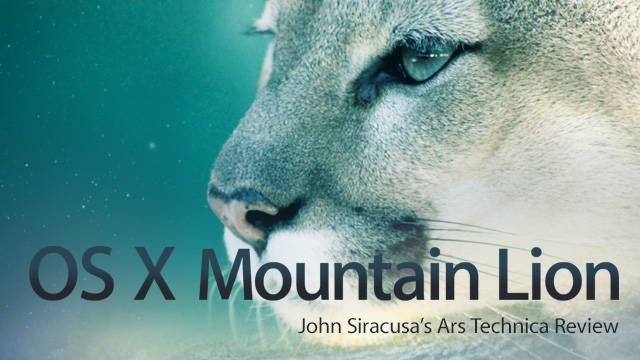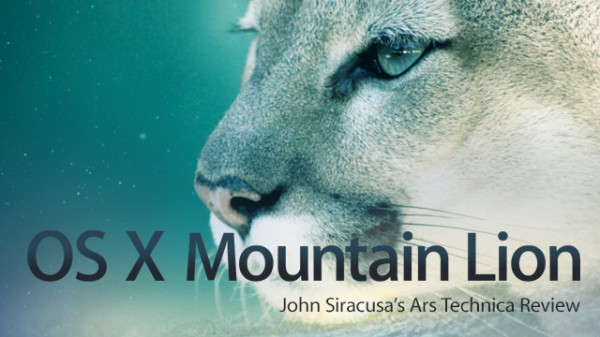

Almost exactly a year ago, when Apple released Mac OS X 10.7 (Lion), Ars Technica put a spin on a time-honored tradition: The website published John Siracusa’s epic review of the software free of charge, as always, but also sold the tome as a $4.99 ebook. (Siracusa’s reviews are legendary among Mac nerds for their depth, precision, and length.) After 24 hours, Ars had sold 3,000 copies.
With the release of Apple’s OS X 10.8 (Mountain Lion) today, Ars is trying out the hybrid free-paid model again for Siracusa’s 26,000-word review. “The ebook format proved rather popular last year, so we’ve taken extra care this year to make the ebook version every bit as good as the web version,” said Ken Fisher, Ars Technica’s founder and editor, in an email.
Fisher said Ars sold “several thousand” paid copies of the Lion review in total, but he wouldn’t provide a specific number. Siracusa did not share in those profits, because Ars had negotiated a one-time fee with Siracusa upfront; they’d never done this before, and no one was sure how well it would go. “This time we were careful to structure an agreement that would explicitly compensate John for each purchase,” Fisher said.
Unfortunately, the process of producing and selling an ebook, like the initial release of a major operating system, is still a little buggy. The utopian vision of ebook publishing — instantaneous publishing across platforms, bug-free production — is still a ways away. Siracusa’s review went live a few hours ago, but the ebook is nowhere to be found on what would seem to be the two most important ebook stores for it: Apple’s iBookstore and Amazon’s Kindle.
(Update: Amazon approved the Kindle version on Wednesday night, according to a tweet from Siracusa at 5:55 p.m. Eastern. But a technical problem lasting several hours prevented iPad users from opening the book in the Kindle app.)
Amazon has a simpler and quicker process for publishing an ebook than Apple, but Ars “incorrectly predicted the publication lag time,” meaning Ars is missing out on the critical first wave of nerdy excitement. As for an iBookstore version, Ars wouldn’t have been able to even submit the book to Apple for review if it wanted to until today, because the content was protected by NDA until Mountain Lion’s public release. Apple’s review process could take two weeks. (That’s what happens when the same company controls the content and the distribution.) Siracusa says an iBookstore version probably isn’t in the cards, irony of ironies.
At the moment, only paying Ars Premier subscribers can download ebook versions, in unrestricted .epub (for iBooks, Nook, and more) and .mobi (for Kindle) versions of the book. (Premier membership is $5 per month, which just happens to be the same price as the ebook itself.)
Of course, being on the major ebook sales platforms also means giving them a piece of the pie. Ars Technica had considered selling the ebook at a lower price, but Amazon’s tiered pricing incentivizes slightly higher prices. By my math, according to this complicated pricing page, Ars will take in somewhere around $2.70 for every ebook sold in the U.S. store once it’s posted. And Siracusa takes an undisclosed percentage of that.
Unfortunately for Siracusa’s sanity, there are still severe limitations on both the creation and reading sides of ebooks. User experiences vary widely. From Siracusa’s blog today:
For the best ebook reading experience, use a device or application that supports Kindle Format 8. KF8-capable readers support amazing new technologies like text that flows around images and the ability to tie a caption to an image. Yes, that was sarcasm.
Unfortunately, many Kindle reading devices and application don’t support Kindle Format 8 — most notably, the iOS Kindle app. The Mac version does support KF8, however, as does the Kindle Fire.
The Kindle ebook is a single file that contains two versions of the content: one in Kindle Format 8 and one in the older Kindle format. Open the same ebook file in both the Mac and iOS Kindle reader applications and you’ll see two very different appearances.
You could read Siracusa’s Twitter feed on any given day in the last few weeks to see what a trial it has been.
It seems like a hell of a lot of work for a lousy ebook, but there is money in that banana stand. We’ve written before about the value in repurposing otherwise free content into paid ebooks. Consumers are willing to pay for the convenience, simplicity, and uncluttered design of a single file. (We’ve even tried it ourselves with a free ebook featuring past work; more to come there.)
The success of Siracusa’s last ebook might have inspired another well-known Mac blogger, Federico Viticci of MacStories, to release a similar ebook for Mountain Lion. Viticci is selling a PDF version of his Mountain Lion review (apparently eschewing the iBooks and Kindle stores) and bundling other feature stories from the website. That edition sells for $6.99, with 30 percent of proceeds going to the American Cancer Society.
Viticci wrote on his personal blog that a paid ebook is a way for fans to support his work, many of whom have been asking for a way to give him money. Likewise, Siracusa wrote that his paid ebook is the best way for people to say “thanks” and get something in return.
Siracusa has said before he worries his nerdy, niche audience is a shrinking piece of a growing pie, as Apple products now reach a mainstream audience. “But the web traffic and ebook sales from last year’s Lion review showed me that, at the very least, my audience is still growing in absolute numbers even as it may be shrinking as a percentage of the whole,” he wrote.
Fisher told me the web — mature, open, free — remains the primary platform for Ars Technica content, while ebooks are a new frontier.
“The overwhelming majority of readers will read the review online, and that’s our primary way to share the review with the world,” he said. “Those who want to buy the ebook can, and we love it when they do, but the web is still our home and its the force that is driving readers to the review, in whatever format they consume it in.”